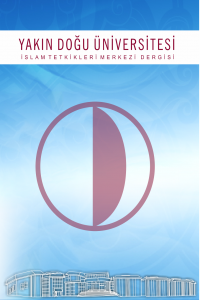Abstract
Zihni ve öznel varlık meselesi İslam felsefesi ve kelamının eski meselelerinden
biri olup ilmin tahakkuk ve beyanında önemli bir role sahiptir. Bu
çalışmada bu konunun İslam felsefesinin ibdai meselelerinden biri olduğu
beyanından sonra Molla Sadra’nın düşünceleri ekseninde zihni varlığın ispatının
delilleri ele alınmıştır. Molla Sadra’ya göre zihne gelen her makule
-süna-i yaygın yüklenti ile değil- öncelikli zati yüklenti ile o makulenin
kendisidir ve zihinde mefhum unvanıyla şekil bulun şey hakikati ve özü
itibarıyla nefsani niteliktir. Nihayetinde de zihni ve öznel varlık hakkında
dillendirilen nazariyelerin filozofların nazariyesi, izafe nazariyesi ve şebeh
(gölge) nazariyesi adı altında açıklanmış ve incelenerek eleştirilmiştir.
Keywords
Zihni varlık nesnel varlık süna-i yaygın yüklenti öncelikli zati yüklenti Sadr’ul-Mutallihin
References
- Allame Tabatabai, Muhammed Hüseyin. Bidayet’ul-Hikme,. Kum: İntişarat-ı Dar’ul-İlm, 1377. —. Nihayet’ul-Hikme. Tahran: İntişarat-ı el-Zehra, 1390.
- Amuli, Abdullah Cevadi. Rahika-i Maktum. Kum: İntişarat-ı İsra, 1382.
- Dinani, Gulam Hüseyin İbrahimi İbrahim. Felsefe Suhreverdi. Tahran: İntişarat- ı Hikmet, 1382.
- er-Râzî, Ebû Abdullah Fahreddin Muhammed b. Ö mer Fahreddin. el-Mebahis’ul- Maşrikiye. Kum: İntişarat-ı Bidar, Trs .
- İbni Sînâ, Ebû Ali Hüseyn b. Abdillâh b. Alî. el-İşarat vel-Tenbihat (Hemrah Şerh-i Hace Nasreddin Tusi). Tahran: Neşr-i Kitap, 1403. —. Talikat. Kum: Mektebet’ul-İlam’ul-İslami, 1404.
- Kuşçu, Fazıl. Şerh’u Tecrid’ul-İtikad. Kum: Mektebet’ul-İlam’ul-İslam, 1414.
- Lahici, Abdulrezzak b. Ali. Şevarik’ul-İlham. Tahran: Mektebet’u Farabi, Trs.
- Molla Sadra, Sadrüddîn Muhammed b. İbrâhîm eş-Şîrâzî. el-Hikmetü’l-Müte’âliye fî Esfâri’l-Akliyyeti’l-Erba’a. Kum: Menşuratu Mustafevi, 1383. —. el-Şevahid’ul-Rububiye. Farsça Çeviri Cevad Muslih. Tahran: İntişarat-ı Suruş, 1366.
- Mutahari, Murteza. Mecmua-i Asar. Tahran: İntişarat-ı Sadra, 1380.
- Nuşin, Gulam Hüseyin Rızanejad. Hikmetname Şerh ve Hevaşi-i Menzume-i Hikmet-i Hacı Molla Hadi Sebzevari . Tahran: İntişarat-ı el-Zehra, 1380.
- Sebzevari, Molla Hâdî b. Mehdî b. Hâcı Mirzâ. Mecmua-yı Resail-i Felsefi. Tahran: İntişarat-ı Encumen-i İslami, 1360.
- Şirazi, Seyyid Razi. Dersha-yı Şerh-i Manzume. Tahran: İntişarat-ı Hikmet, 1383.
- Tusi, Hace Ebû Cafer Nasirüddin Muhammed b. Muhammed b. Hasan. Tecrid’ul- İtikad. Kum: Mektebet’ul-İlam’il-İslami, 1407.
- Yezdi, Mehdi Hairi. İlm-i Külli. Tahran: İntişarat-ı Hikmet, 1404.
Abstract
The issue of mental mode of existence is one of the old frequently
discussed topics in Islamic philosophy and theology playing a striking
role in the manner of realization and explanation of knowledge. Emphasizing
the point that this issue is a novel one in Islamic philosophy, the present
article deals with the arguments behind proving the mental mode of
existence with special focus on the doctrine of MullaSadra. According to
him, each category occurring to the mind is the very category based on
the primary essential predication rather than on the common technical
predication; and what occurs to the mind as a concept is a mental quality
in its essence and reality. Finally the prevalent views on mental mode of
existence are raised and analyzed in the framework of the theory of the
theosophers, that of relation, and that of Shabah.
Keywords
mental mode of existence primary essential predication common technical predication Sadr al Mutaallihin
References
- Allame Tabatabai, Muhammed Hüseyin. Bidayet’ul-Hikme,. Kum: İntişarat-ı Dar’ul-İlm, 1377. —. Nihayet’ul-Hikme. Tahran: İntişarat-ı el-Zehra, 1390.
- Amuli, Abdullah Cevadi. Rahika-i Maktum. Kum: İntişarat-ı İsra, 1382.
- Dinani, Gulam Hüseyin İbrahimi İbrahim. Felsefe Suhreverdi. Tahran: İntişarat- ı Hikmet, 1382.
- er-Râzî, Ebû Abdullah Fahreddin Muhammed b. Ö mer Fahreddin. el-Mebahis’ul- Maşrikiye. Kum: İntişarat-ı Bidar, Trs .
- İbni Sînâ, Ebû Ali Hüseyn b. Abdillâh b. Alî. el-İşarat vel-Tenbihat (Hemrah Şerh-i Hace Nasreddin Tusi). Tahran: Neşr-i Kitap, 1403. —. Talikat. Kum: Mektebet’ul-İlam’ul-İslami, 1404.
- Kuşçu, Fazıl. Şerh’u Tecrid’ul-İtikad. Kum: Mektebet’ul-İlam’ul-İslam, 1414.
- Lahici, Abdulrezzak b. Ali. Şevarik’ul-İlham. Tahran: Mektebet’u Farabi, Trs.
- Molla Sadra, Sadrüddîn Muhammed b. İbrâhîm eş-Şîrâzî. el-Hikmetü’l-Müte’âliye fî Esfâri’l-Akliyyeti’l-Erba’a. Kum: Menşuratu Mustafevi, 1383. —. el-Şevahid’ul-Rububiye. Farsça Çeviri Cevad Muslih. Tahran: İntişarat-ı Suruş, 1366.
- Mutahari, Murteza. Mecmua-i Asar. Tahran: İntişarat-ı Sadra, 1380.
- Nuşin, Gulam Hüseyin Rızanejad. Hikmetname Şerh ve Hevaşi-i Menzume-i Hikmet-i Hacı Molla Hadi Sebzevari . Tahran: İntişarat-ı el-Zehra, 1380.
- Sebzevari, Molla Hâdî b. Mehdî b. Hâcı Mirzâ. Mecmua-yı Resail-i Felsefi. Tahran: İntişarat-ı Encumen-i İslami, 1360.
- Şirazi, Seyyid Razi. Dersha-yı Şerh-i Manzume. Tahran: İntişarat-ı Hikmet, 1383.
- Tusi, Hace Ebû Cafer Nasirüddin Muhammed b. Muhammed b. Hasan. Tecrid’ul- İtikad. Kum: Mektebet’ul-İlam’il-İslami, 1407.
- Yezdi, Mehdi Hairi. İlm-i Külli. Tahran: İntişarat-ı Hikmet, 1404.
Details
| Primary Language | Turkish |
|---|---|
| Journal Section | Research Article |
| Authors | |
| Publication Date | June 1, 2018 |
| Submission Date | April 12, 2018 |
| Acceptance Date | May 7, 2018 |
| Published in Issue | Year 2018 Volume: 4 Issue: 1 |
Journal of Near East University Faculty of Theology is licensed under a Creative Commons Attribution-NonCommercial 4.0 International License (CC BY NC).

